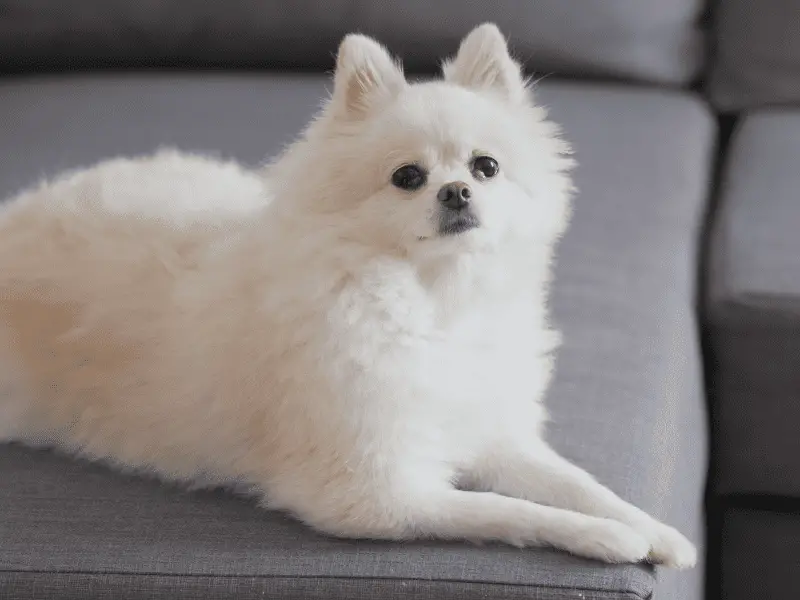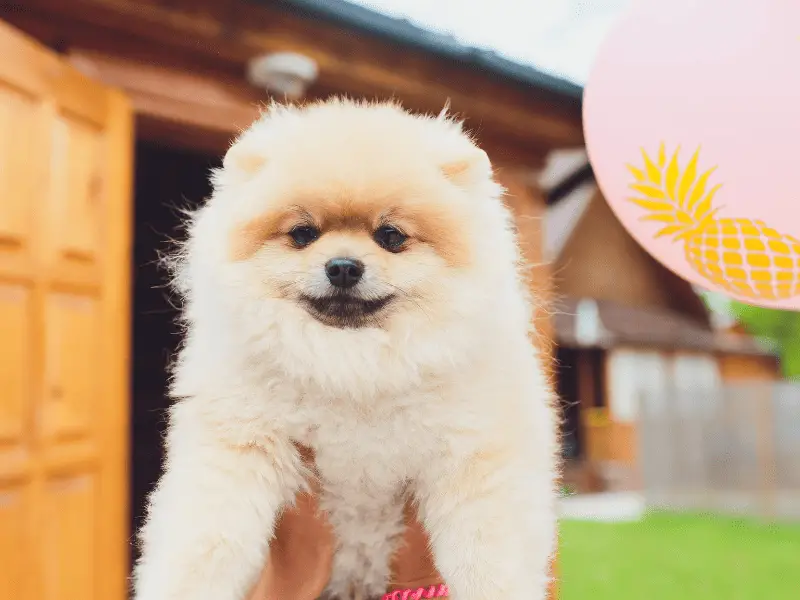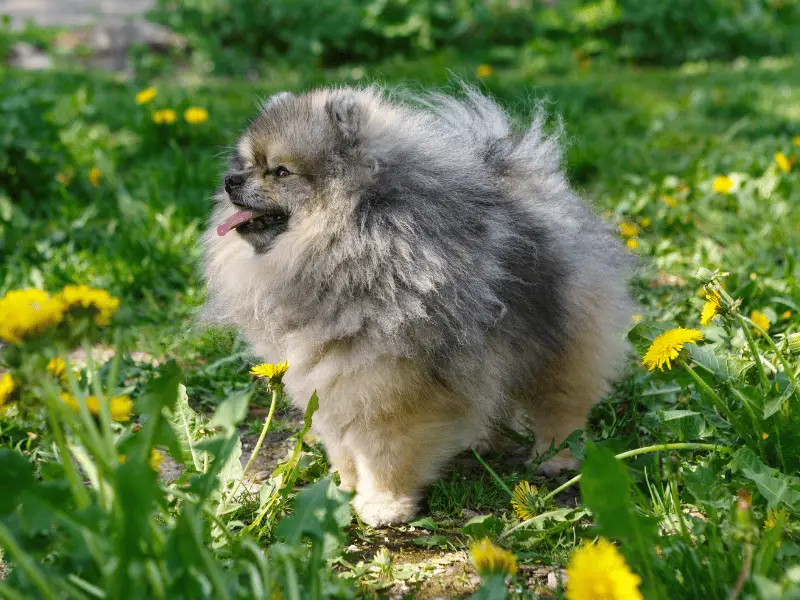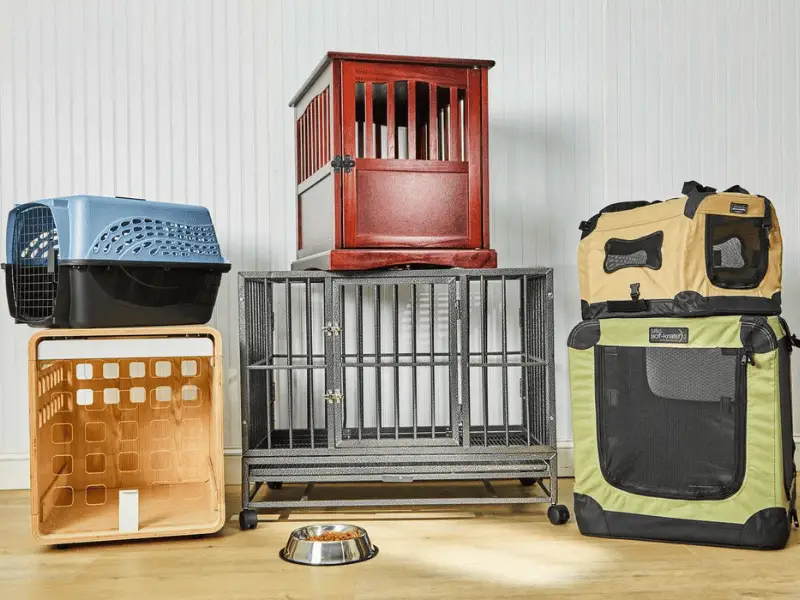Engaging, spirited, and irresistibly adorable, the small dog breed Pomeranian has effortlessly charmed its way into the lives and hearts of dog enthusiasts worldwide. Our in-depth guide provides an expansive exploration into the world of Pomeranians, enveloping every aspect of this fascinating breed.

Despite their pint-sized appearance, Pomeranians boast a fearless disposition, never shying away from a confrontation, even with much larger dogs. This surprising boldness adds a unique dimension to their lovable personalities.
1. Detailed Historical Background of Pomeranians
The Pomeranian’s history can be traced back to the ancient Spitz lineage, which originated in the Arctic region. The breed’s ancestors were larger working dogs used for herding and pulling sleds, weighing up to 30 pounds.
The Pomeranian, as we know it today, was developed in the Pomerania region, which is now part of modern-day Germany and Poland. Over time, these dogs were selectively bred to become smaller, making them more suitable companion animals.
The breed gained popularity in the 18th century when Queen Charlotte and her granddaughter, Queen Victoria, became avid Pomeranian enthusiasts.
Queen Victoria imported several Pomeranians from different countries and established a breeding program at her kennels, contributing to the breed’s refinement and reduction in size. This royal interest in the breed and their participation in dog shows contributed to the Pomeranian’s widespread appeal.
2. Physical Characteristics and Genetic Traits Pomeranians
The Pomeranian is a compact, toy-sized dog, typically weighing between 3 and 7 pounds (1.4-3.2 kg) and standing 6-7 inches (15-18 cm) tall at the shoulder. Their most distinctive feature is their abundant double coat, with a soft, dense undercoat and a long, straight, harsh outer coat that stands away from the body.
The breed comes in a variety of colors, including orange, black, white, cream, blue, brown, and sable, as well as various patterns and markings. Some Pomeranians even exhibit a unique “merle” coat pattern with a marbled or speckled appearance.
Pomeranians have a fox-like expression, dark almond-shaped eyes, small erect ears, and a plumed tail curling over their back. Their small size and striking appearance make them both visually appealing and highly adaptable.
Their sturdy bone structure and overall balance contribute to their agility and ability to excel in various dog sports, such as obedience and agility competitions.
3. Pomeranian’s Personality Traits
Pomeranians are known for their intelligent, affectionate, and lively personalities. They are curious, alert, and enjoy being the center of attention. Despite their small size, Pomeranians can be quite bold and confident, sometimes even exhibiting a “big dog” attitude towards larger dogs or unfamiliar situations.
These dogs form strong bonds with their owners and can be quite protective, making them excellent watchdogs. However, they can also be prone to excessive barking if not properly trained. Pomeranians generally get along well with children and other pets, but due to their small size, they should be supervised during interactions to prevent accidental injury.
Pomeranians are also known for their intelligence and eagerness to learn, making them highly trainable. However, they can be stubborn sometimes, so consistent, positive reinforcement-based training methods are essential for success.
4. Health Considerations of Pomeranians
Pomeranians have a life expectancy of 12-16 years, but like any breed, they may be prone to certain health issues. Here are some specific tips on how to deal with some of the common health problems that Pomeranians are prone to:

Patellar luxation: This is a condition in which the kneecap slips out of place. It can be caused by genetics, injury, or obesity. If your Pomeranian has patellar luxation, you may notice that they limp or have difficulty walking. Treatment options include surgery, medication, and weight management. Pomeranians have a higher prevalence of patellar luxation compared to other breeds, with up to 20% of Pomeranians being affected.
Hypothyroidism: This is a condition in which the thyroid gland does not produce enough hormones. It can cause weight gain, lethargy, and skin problems. If your Pomeranian has hypothyroidism, they may need to take medication for the rest of their life. In the United States, hypothyroidism is estimated to affect around 0.2% of the Pomeranian population.
Dental problems: Pomeranians are prone to dental problems due to their small mouths and crowded teeth. Regular dental care is essential for preventing these problems.
You should brush your Pomeranian’s teeth at least twice a week and take them to the veterinarian for dental cleanings every six months. In fact, up to 85% of dogs over the age of three experience some form of dental disease, with toy breeds like Pomeranians being especially susceptible.
Tracheal collapse: This is a condition in which the tracheal rings weaken and collapse. It can cause coughing, difficulty breathing, and respiratory distress. If your Pomeranian has tracheal collapse, they may need to take medication or surgery. Pomeranians are among the breeds most commonly affected by tracheal collapse.
Regular veterinary check-ups and preventive care can help detect and manage these health concerns early.
5. Nutrition and Diet for Pomeranians
A balanced diet is essential for maintaining the overall health of a Pomeranian. It is important to choose a high-quality dog food formulated for small breeds to provide the necessary nutrients and energy levels for their size and metabolism.
The amount of food required will vary depending on factors such as age, weight, activity level, and individual metabolism. Consult your veterinarian for guidance on the appropriate type and amount of food for your Pomeranian.
Monitoring their weight and adjusting food intake is essential when feeding a Pomeranian. Obesity can lead to numerous health issues and should be avoided by diet and exercise. Toy breeds, including Pomeranians, are more prone to obesity than larger breeds, with one study finding that 40% of Pomeranians were overweight or obese.
6. Exercise and Activity Levels
Pomeranians have moderate exercise needs and benefit from daily walks and indoor play sessions. These activities provide mental and physical stimulation, preventing boredom and promoting overall well-being. Due to their small size, Pomeranians can adapt well to apartment living, provided they receive regular exercise and mental enrichment.

It is important to note that Pomeranians are prone to overheating, so exercise should be limited during hot weather and always provide access to fresh water.
7. Grooming and Maintenance
Grooming is essential to Pomeranian care, as their abundant double coat requires regular attention. They should be brushed 2-3 times per week to prevent matting, remove loose hair, and distribute natural oils throughout the coat. More frequent brushing may be necessary during shedding seasons, as Pomeranians are known for their heavy shedding, particularly in the spring and fall.
Additionally, Pomeranians require regular nail trimming, ear cleaning, and dental care to maintain optimal health. Introducing grooming routines early in a Pomeranian’s life is essential to ensure they become comfortable and accepting of the process.
8. Training and Behavior
Early training and socialization are crucial for developing a well-behaved, confident Pomeranian. Basic obedience training, crate training, and teaching polite behaviors (such as not jumping on people) should begin as early as possible. Pomeranians can be prone to excessive barking, so teaching a “quiet” command and providing appropriate outlets for their energy can help curb this behavior.
Socialization with various people, animals, and environments is important for building a Pomeranian’s confidence and reducing the likelihood of fear or aggression issues later in life. Introducing your Pomeranian to new experiences in a positive and controlled manner can help them develop into a well-rounded and adaptable companion.
9. Living with a Pomeranian
Pomeranians can make wonderful companions for a variety of households, including families with children, seniors, and multi-pet homes. Their small size and adaptable nature make them suitable for different living environments, from apartments to large houses. However, it is essential to supervise interactions between Pomeranians and young children or larger pets to prevent accidental injury due to their small size.
When considering the ideal home environment for a Pomeranian, it is important to take into account factors such as noise levels, outdoor access, and household activity. Pomeranians may be more sensitive to loud noises and commotion, so a calm and stable environment is beneficial for their well-being.
10. Choosing a Pomeranian
When considering a Pomeranian, it is important to research reputable breeders or consider adoption through a rescue organization. Understanding breed standards and preparing your home for a Pomeranian’s arrival will ensure a smooth transition and a happy life together.
When selecting a breeder, make sure they prioritize health testing, adhere to breed standards, and provide proper socialization for their puppies. Adoption is another option for those looking to provide a loving home for a Pomeranian in need, with many rescue organizations specializing in Pomeranians and other small breeds.
11. Expert Opinions
Veterinarians, professional breeders, and experienced Pomeranian owners can provide valuable insights and advice on raising and caring for this small dog breed. By seeking expert guidance and following the recommendations provided in this guide, you can create a nurturing environment that promotes your Pomeranian companion’s health, happiness, and well-being. Embracing the unique qualities and requirements of the Pomeranian will ensure you enjoy a rewarding and lasting bond with this charming and spirited small dog breed.

FAQ
Here is a FAQ about Pomeranian care:
Q: How much exercise does a Pomeranian need?
A: Pomeranians have moderate exercise needs and benefit from daily walks and indoor play sessions. These activities provide mental and physical stimulation, preventing boredom and promoting overall well-being. Due to their small size, Pomeranians can adapt well to apartment living, provided they receive regular exercise and mental enrichment.
Q: What kind of food should I feed my Pomeranian?
A: A balanced diet is essential for maintaining the overall health of a Pomeranian. It is important to choose a high-quality dog food formulated for small breeds, which will provide the necessary nutrients and energy levels for their size and metabolism. The amount of food required will vary depending on factors such as age, weight, activity level, and individual metabolism. Consult your veterinarian for guidance on the appropriate type and amount of food for your Pomeranian.
Q: How often do I need to groom my Pomeranian?
A: Pomeranians have abundant double coats that require regular grooming. They should be brushed 2-3 times per week to prevent matting, remove loose hair, and distribute natural oils throughout the coat. More frequent brushing may be necessary during shedding seasons, as Pomeranians are known for their heavy shedding, particularly in the spring and fall.
Q: What are some common health problems that Pomeranians are prone to?
A: Pomeranians are prone to a few common health problems, including patellar luxation, hypothyroidism, dental problems, and tracheal collapse. These problems can be managed with proper care and treatment.
Q: Where can I find a reputable breeder or rescue organization for Pomeranians?
A: There are many reputable breeders and rescue organizations that specialize in Pomeranians. You can find a list of breeders and rescue organizations in your area by searching online or contacting your local veterinarian.


